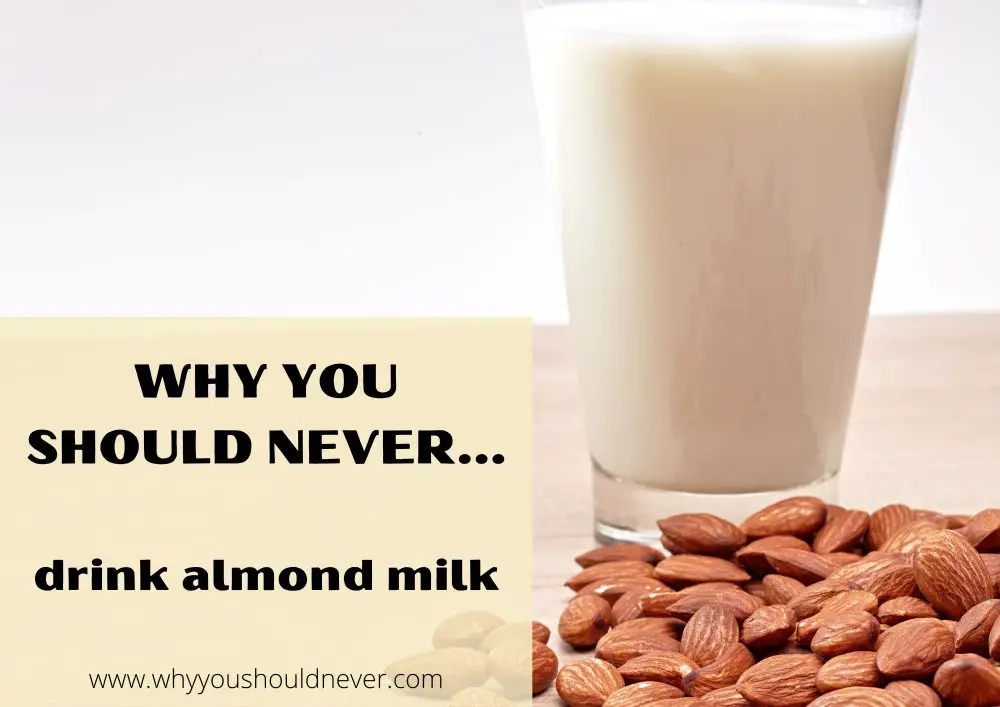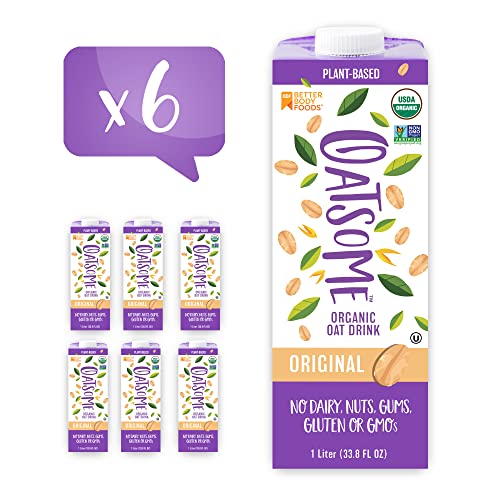![]()
Why You Should Never Drink Almond Milk
Almond milk. The trendy, nutty, and downright delicious alternative to cow’s milk that has taken over the dairy aisle. It’s the go-to option for those who are lactose intolerant, vegan, or just trying to be a little bit healthier.
As far as plant-based milks go, it seems like almond milk is the king of the crop. And now that it’s being mass-produced, it’s much more affordable and accessible than ever before.
But before you pour yourself a tall glass of almond milk and pat yourself on the back for making a healthy choice, you might want to hear us out. Turns out, almond milk might not be all it’s cracked up to be.
In this article, we’ll take a look at some of the very compelling reasons why drinking almond milk, at least the store-bought, factory-produced kind, might not be such a good idea.
9 reasons why you shouldn’t drink almond milk
1. It’s not great for the environment
While you may think that almond milk is a more sustainable and eco-friendly option compared to dairy milk, the truth is that almond farming can be quite harmful to the environment. The majority of almond farms are located in California, where they use up to 10% of the state’s water supply.
Almonds are also heavily reliant on bees for pollination, contributing to the current bee population decline.
And if all of that wasn’t bad enough, almond farming has been linked to the decline of certain bird species due to the removal of natural habitats.
2. It’s not as nutritious as you think
Many people turn to almond milk as a healthier alternative to dairy milk, but the truth is that it’s not as nutritious as you might think. While it does contain some healthy fats and protein, it’s often heavily processed and loaded with added sugars and preservatives.
What’s more, most store-bought almond milk is fortified with vitamins and minerals (vitamin B12 to be precise), which may not be as easily absorbed by the body as those found naturally in whole foods.
3. It can cause digestive issues and allergic reactions
If you’re lactose intolerant or have a dairy allergy, almond milk has probably been touted as the best alternative. However, some people may have trouble digesting almond milk due to its high fiber content. Digestive issues such as bloating, gas, and diarrhea have been known to affect sensitive almond milk drinkers.
Then there’s the issue of allergies. If you suffer from a nut allergy, you’re probably gonna have a really bad time drinking almond milk. An allergic reaction to almond milk can include hives, nausea, itching, abdominal pain, and diarrhea.
4. It may contain harmful additives and emulsifiers
Store-bought almond milks contain all types of additives and preservatives, many of which won’t do your body any favors.
Ever heard of carrageenan? No? Well, you need to know about it. Carrageenan, a substance derived from different types of seaweed, is a thickening agent that many brands use in their non-dairy milks. This emulsifier has been linked to gastrointestinal problems, colon damage, and even cancer. Nasty stuff!
Emulsifiers are used to keep milk from separating, but these additives may have negative health effects, most of which aren’t found in dairy milk.
Other chemicals, such as acrylamide, a harmful chemical that forms when certain foods are heated at high temperatures, should also be of concern. If some brands use roasted almonds, chances are, the milk will contain this nasty chemical.
5. It’s not a great source of calcium
Calcium is an essential nutrient for strong bones and teeth, and many people rely on dairy milk for their daily calcium intake.
While you can find almond milk that’s been fortified with calcium, this type might not be as easily absorbed by the body as the calcium found in dairy milk. And even if calcium is present, the levels will likely be lower than those found in dairy milk, making it a less than ideal option for those looking to increase their calcium intake.
6. Almond milk doesn’t contain many almonds
I know, crazy, right?!
Yet, it’s true – almond milk doesn’t actually contain a lot of almonds. While the exact amount varies between brands, most store-bought almond milks contain only about 2% almonds. The rest is usually made up of water, sweeteners, and thickeners.
This means that you’re not getting the same nutritional benefits as you would from eating whole almonds, which are a good source of protein, healthy fats, and fiber.
7. It’s not as creamy or tasty as dairy milk
Okay, so this one’s a bit subjective, but even as someone who gave up drinking dairy years ago – I can honestly say the two are incomparable. While almond milk is pretty darn delicious in its own right, there’s just something missing in terms of flavor and texture. And let’s not forget about the lack of frothiness in almond milk lattes – it’s just not the same.
8. It’s expensive
So, I did start off by saying that the almond milk of today is much cheaper than it was before it became so ubiquitous. But cheaper doesn’t mean cheap. The fact is, 1 liter of almond milk, when compared to dairy milk of the same quantity, is considerably more expensive. Almonds themselves aren’t cheap, so it stands to reason that their milk wouldn’t be, either.
That’s why drinking almond milk is often seen as a luxury, something middle class hipsters do. If you’re looking to replace dairy with almond milk entirely, you’ll need some pretty steep pockets, especially if you’re a regular coffee/tea and breakfast cereal consumer.
9. It’s not sold everywhere
One thing to keep in mind when it comes to almond milk is that you might not always be able to find it. Yes, it’s becoming more popular and more widely available, but if you’re in a rural area served only by a small, local grocery store, the likelihood of them stocking it is slim.
Now, I know it’s a pretty long list of negatives, but it’s not all doom and gloom. Most of the issues associated with drinking almond milk can be mitigated with a little bit of effort and mindfulness.
For example, if you’re concerned about the environmental impact of almond farming, you can look for brands that use sustainable farming practices.
If you’re worried about digestive issues or harmful additives, you can read labels carefully and opt for brands that use simple, whole-food ingredients.
And if you’re missing the taste and texture of dairy milk, you can experiment with different milk alternatives until you find one that suits your palate. Oat milk is an incredibly creamy, cheaper alternative to almond milk, for instance.
But there’s an even better solution. Yep, you guessed it – make your own almond (or nut) milk!
How to make your own almond milk
That’s right! Making your own almond milk is not only a great way to ensure that you’re getting pure, unadulterated almond goodness, but it’s also surprisingly easy and cost-effective. All you need are some raw almonds, water, and a blender or food processor. Here’s how to do it:
- Soak 1 cup of raw almonds in water overnight or for at least 6 hours.
- Drain the almonds and rinse them well.
- Add the soaked almonds and 4 cups of fresh water to a blender or food processor.
- Blend on high speed for 1-2 minutes, or until the mixture is smooth and creamy.
- Strain the mixture through a nut milk bag or cheesecloth into a bowl or jug, squeezing out as much liquid as possible.
- Transfer the almond milk to a jar or bottle and store in the fridge for up to 5 days.
That’s it! You can add a pinch of salt or a sweetener like honey or maple syrup if you like, but the beauty of making your own almond milk is that you can customize it to your taste.
Everything you need to make almond milk at home
Plus, you can use the leftover almond pulp in recipes like smoothies, baked goods, or even as a base for homemade almond flour. Not only is making your own almond milk more sustainable and eco-friendly than buying pre-made versions, but it’s also more cost-effective in the long run.
You can also buy almonds sourced from local farmers, in order to mitigate the environmental damage associated with almond farming.
So, if you’re a fan of almond milk but want to avoid the pitfalls of store-bought versions, give making your own a try!
Wrapping up
Please don’t take this article as a thinly-veiled ploy to push you into drinking dairy milk instead of almond milk. The truth is, there is no one-size-fits-all answer when it comes to what we should be drinking. Everyone’s dietary needs, preferences, and values are different, and what works for one person may not work for another.
What’s important is that we approach our food and drink choices with mindfulness and critical thinking, taking into account factors like nutrition, sustainability, and taste.
While almond milk and other nut milks like hazelnut, cashew, and pecan (seriously, you can make milk out of any nut these days!) certainly do have their drawbacks, they’re still pretty awesome alternatives for those who are lactose intolerant or vegan. That can’t be overlooked.








